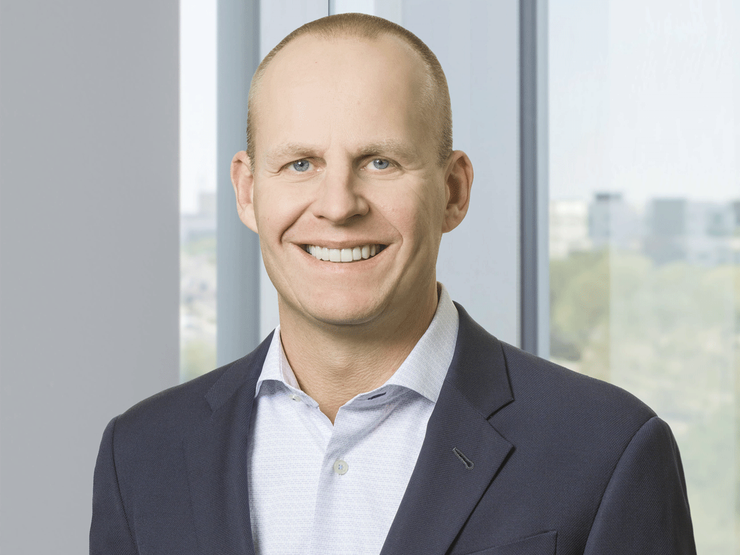The Scene
“I’ve gone from a lawyer to a consultant to a garbage man,” Jon Vander Ark says, joking that his family believes his career has been in perpetual decline. The Harvard Law graduate was a partner at McKinsey before joining Republic Services, the $75 billion-plus recycling company he now leads from its base in Phoenix, Arizona.
Nobody dreams of their child becoming a garbage man, Vander Ark says. But he hails his frontline workers and has tried to infuse their roles with a bigger purpose, as Republic expands from waste management to faster-growing environmental services, including a $320 million network of polymer centers that recycle plastics into resins for sustainable packaging.
The company is going “full speed ahead” with such investments, he says, despite an uncertain economic backdrop. Customer demand has convinced him that Republic is not chasing a fad, he says: “It’s great to have a story and be environmentally sustainable, but you’ve got to be economically sustainable. Those two things have to work together.”
This interview has been condensed and edited for clarity.
The View From Jon Vander Ark
Andrew Edgecliffe-Johnson: How do you define this moment for the company?
Jon Vander Ark: We’re a $14 billion player in a $110 billion recycling and waste market. People often think of it as a duopoly or an oligopoly because they only know a few names. But we have a sub-15% market share, so there’s plenty of runway for growth, organically, through price increases and M&A. We moved more substantially into the industrial hazardous waste space we call “environmental solutions.” That’s a very fragmented industry with lots of opportunity for growth. And then a third domain for growth is sustainability innovation: taking decarbonization and circularity, and trying to build real businesses that are good for the environment and for our shareholders. You put all that together and we’re not recession-proof, but we’re a recession-resilient business.
What behavior are you seeing from your biggest customers now?
If a bank is the front door of the economy, we’re the back door, because we service everybody. Coming out of the election, we were optimistic that we would see growth, because both candidates were talking about building more housing… and a manufacturing renaissance. I think we’re challenged in the short term on both of those fronts. We’re not going to unlock construction until the 10-year [Treasury yield] gets down to drive lower mortgage rates. Then in manufacturing, I’d say we’re in absolute paralysis. How could you decide whether you’re going to make a capital investment in China, the United States, Europe, Mexico, or Canada when you don’t know what the rules are? It’s impossible to make an investment decision. I’m cautiously optimistic that we are in a negotiating phase, and we will get predictability and stability. For us, it’s just about getting stability — the rules that unlock the investment —and then we’re off and running.
How does a McKinsey guy end up in waste management?
I didn’t know anything about the business, but I came for three reasons, and I stayed for three reasons. I like the fundamental nature of the work. We have people who get up in the dark of night and do a very safety-sensitive business that society undervalues. Covid helped in terms of celebrating frontline people, but in general, no one dreams of having a kid grow up to be a garbage man. I love the people here. I thought they were sneaky smart. And I have a belief that the world’s heating up, and we have a moral obligation to arrest that trend, and we could make a difference in that trajectory.
Where is AI having the biggest impact on what you do?
My view of AI is that it’s going to be hugely transformational, and it’s wildly oversold in terms of the timing of the impact. We’re using it in lots of places. One example is in our recycling centers: when we empty a recycling container, a camera scans that stream rapidly, and can sense contamination. And if it’s contaminated, then we’re going to charge you.
We’re also using it with our customer service agents. We get 12 million calls a year. Now the system is listening to those calls, co-piloting next to our agents, and producing a summary of the call. We’re going to get more accurate information, we’re going to save our agents time, and we’re going to take out the crappiest part of their job. We don’t have to fire a single person: Just through natural attrition, you can take 12 million calls with, over time, hundreds of fewer people.
You’ve got 42,000 people. What binds them to the company?
Helping somebody understand you’re not just picking up a four-yard container 140 times a day; you’re making a difference in your community. You’re keeping it clean, but you’re also changing the trajectory of the planet. The only reason we can do the polymer center is because we pick up something 5 million times a day. Getting people connected to that bigger purpose, we found to be hugely valuable. Pay is very important, but if you think you’re going to get people engaged just by paying them competitively, you’ve completely missed a trick. People want to feel connected, they want purpose, they want respect.
How do you use your time with that insight in mind?
I try to be out of the decisions and into the details. I stole this from Jeff Bezos. He talks about one-way doors, which are decisions that are of scale and largely irreversible. I should be a part of those decisions. If it’s not both of those things, [I don’t need to be]. Leaders want responsibility. They want to feel empowered. So we work together a lot on culture and vision, but then the decisions, I leave to the team.
We are organized across 200 business units and I see probably 20 to 25 of them a year. I travel alone, I put my boots on, and I walk around. I spend time with the general managers, I do roundtables, I talk to drivers. And I find that good news sometimes makes its way to my desk, and bad news never does. You get lots of insights when you’re out on the ground, and that’s what helps me set vision and direction.



